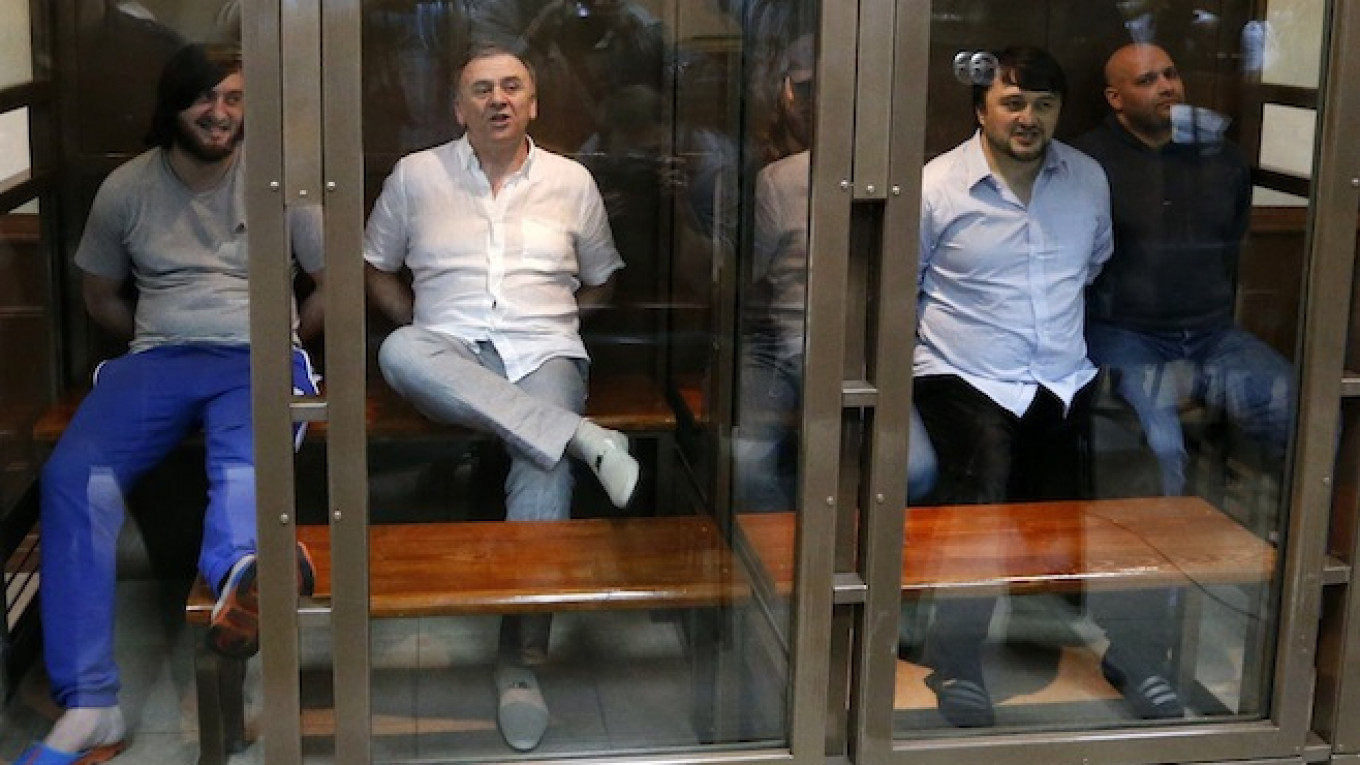The Moscow City Court on Monday handed down life sentences to two of the five men convicted of the 2006 killing of journalist Anna Politkovskaya in a trial that, though bursting with intrigue, left many unanswered questions in its wake.
Convicted triggerman Rustam Makhmudov was sentenced to life alongside his uncle Lom-Ali Gaitukayev, who was found guilty of organizing the murder at the behest of an unknown client.
Investigators said that it was “precisely Gaitukayev who organized the group made up of the other convicts,” and that he “controlled the actions of the participants by phone,” according to a statement posted on the Investigative Committee's website.
Three other men found guilty of tracking Politkovskaya's movements on the day of her murder were also given lengthy prison terms: Ibragim and Dzhabrail Makhmudov received 12 years and 14 years, respectively, in maximum security prison. Sergei Khadzhikurbanov, a former police officer, got 20 years for his involvement.
Although the court fulfilled the prosecution's to sentence the two most culpable defendants to life, a number of questions key to the case remain unanswered.
Crucial among these is the identity of the person or group that ordered Politkovskaya's murder. Investigative Committee spokesman Vladimir Markin said after the sentencing on Monday that “exhaustive measures” had been taken to determine who ordered the killing, and that a separate case had been launched to get to the bottom of the matter.
Murad Musayev, a lawyer who represented the Makhmudov brothers throughout the trial, has been outspoken about his belief that the trial was manipulated by prosecutors and judges throughout the proceedings.
Ahead of the announcement of the verdict on May 27, he wrote on Facebook that the hearing was “just a formality: the sentence, as we all understand, was already decided long ago.”
Equally baffling for many observers is the fact that the five men convicted in May were initially acquitted in 2009 before the Supreme Court ordered the case to be reopened.
Musayev wrote on Facebook that even when the suspects were acquitted in 2009, he knew they would eventually be convicted.
“Too many careers and reputations are on the line in this case,” he wrote.
Despite his apparent pessimism about the case, Musayev also wrote that he intends to file an appeal on his clients' behalves, though he made no secret that his hopes for success remain low, saying that history illustrates the futility of the situation.
The Politkovskaya case has been filled with unexpected developments and allegations of shady behind-the-scenes behavior from the start.
Politkovskaya's children, Ilya and Vera, were so unhappy with the court proceedings and with Judge Pavel Melekhin's behavior that they decided to stop attending the hearings altogether.
"We refuse to come to court, refuse to give any kind of testimony, and also refuse to acknowledge as legitimate any of Judge Melekhin's actions in the consideration of this criminal case," they said in a statement last July.
Politkovskaya was an investigative journalist who covered stories for the opposition-minded Novaya Gazeta that many other journalists in Russia steered clear of. Corruption and human rights abuses by Russian forces in Chechnya were her fortes.
A sixth defendant in the case, former police officer Dmitry Pavlyuchenkov, was sentenced to 11 years in prison last year for his involvement in the case.
See also:
Prosecutors Want Life Terms for Murder Russian Journalist Politkovskaya
Contact the author at a.quinn@imedia.ru
A Message from The Moscow Times:
Dear readers,
We are facing unprecedented challenges. Russia's Prosecutor General's Office has designated The Moscow Times as an "undesirable" organization, criminalizing our work and putting our staff at risk of prosecution. This follows our earlier unjust labeling as a "foreign agent."
These actions are direct attempts to silence independent journalism in Russia. The authorities claim our work "discredits the decisions of the Russian leadership." We see things differently: we strive to provide accurate, unbiased reporting on Russia.
We, the journalists of The Moscow Times, refuse to be silenced. But to continue our work, we need your help.
Your support, no matter how small, makes a world of difference. If you can, please support us monthly starting from just $2. It's quick to set up, and every contribution makes a significant impact.
By supporting The Moscow Times, you're defending open, independent journalism in the face of repression. Thank you for standing with us.
Remind me later.






